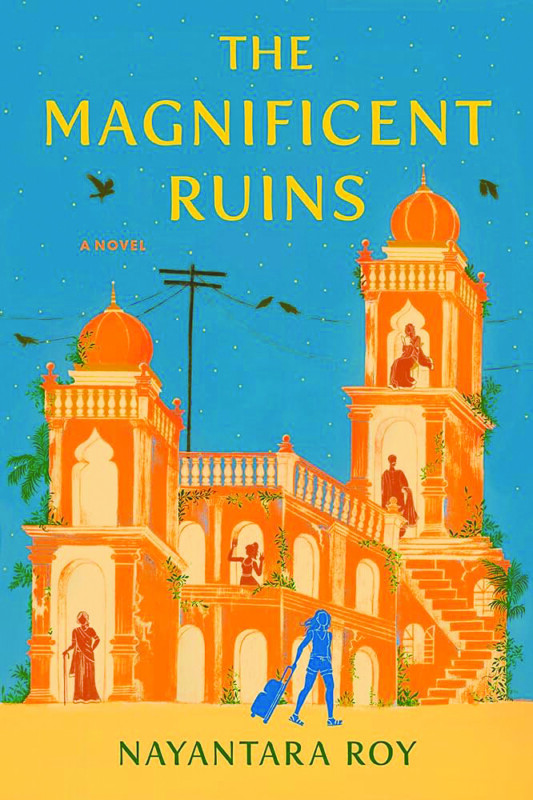The Magnificent Ruins by Nayantara Roy (Algonquin Books, 448 pages)
When I start reading a book that I know I’m going to review I immediately start looking for words, sentences, passages to use as examples of good or bad or mediocre writing. In the first 20 pages of The Magnificent Ruins I wanted to mark up dozens of sentences, meaningful words put together thoughtfully, examples of sharp, witty dialogue.
Nayantara Roy’s debut novel follows Lila De, an Indian American who lives in New York City and is dedicated to her job as an editor at a publishing house. She came to America to live with her dad and stepmom when she was 16, leaving behind her mom and the rest of her extended Lahiri family, and had no plans to return to India.
But that changes when Lila’s grandfather dies and she inherits her family’s crumbling, palace-esque home in Kolkata, India. Upon her return, she’s thrust back into the world of her complicated family, including her mom, who angers quickly and will stop talking to Lila for the smallest of perceived slights, sometimes for months at a time, until her wounds are forgotten and she calls her daughter as if no time has passed.
“The first conversation would be stilted on my end, exuberant on hers. I would revel in a universe where my mother wanted me. Over time, she would begin calling regularly again. Those weeks would inevitably lull me, slightly tipsy from the largesse of her motherhood, into a maternal buzz. And then I would say something that would hurt her feelings, which always meant the punishment of disappearance.”
Her mom, along with her grandmother, aunts, uncles and cousins, all still live in the house Lila has inherited, and none are happy that it’s been left for her — yet they’re genuinely happy to see her. In fact, all of the relationships in the family are messy and complicated, but their love for each other runs deep.
Throughout the book we see the juxtaposition of Lila’s experiences as an American and as an Indian. Before leaving for Kolkata, she visits her dad and stepmom and two half-siblings in Connecticut.
“My siblings were regularly hugged by my father, but he and I had the language of nods and unspoken affections that passed between Indian children born in the ’80s and their fathers. I dreamed of crossing over into the land of effortless holding and kissing that my siblings were citizens of.”
In a more American way, Lila goes to therapy every two weeks, something her family in Kolkata would never understand.
“Therapy felt like a shape-shifting myth across cultures. So acceptable in the Brooklyns and Manhattans of the world that it would be an aberration to not have a therapist, to not have problems. Everyone in New York was ravaged by their love affairs and debt and childhoods, by race and geography and loneliness. In Kolkata, people had fewer problems, because one did not talk about them.”
Those “New York” problems, as it turns out, are alive and rampant in Kolkata. As we meet the Lahiri family, we see these problems unravel slowly: domestic abuse, alcoholism, love affairs and all manner of generational trauma. And Lila isn’t exempt. Along with being a victim of these traumas, she’s at times a perpetrator, engaging, for example, in an affair with a married man — her childhood love, Adil — with seemingly little remorse.
It’s hard to be mad at her, though, given her complicated history with love. She seems to know what she “should” want — namely her American lover, Seth, who is also her star author and whom she openly refuses to commit to. That gets a little messy, though, when Seth comes to Kolkata in an attempt to win her over. (I appreciated that this plot twist supports Lila’s character development and doesn’t feel contrived like similar plot twists in romantic storylines often do.)
There are plenty of other storylines that support Lila’s main character development too, and I had some real feelings — good and bad — for many of Nayantara’s well-developed characters, like Rinki, a friend from Lila’s childhood who serves as a breath of fresh air outside of the Lahiri family.
Within the family, Lila’s grandmother is both loving and terrifying — not unlike Lila’s mom — and the relationship between her mom and grandmother is tenuous. Among other aunts, uncles and cousins, there’s the charming uncle Hari, his subdued wife Mishti, and their daughter Biddy, whose wedding is another plot point and gives the family something to talk about other than what Lila is going to do with the mansion.
Ah, and back to that pesky inheritance. Despite their love for Lila, the family fears betrayal, and Lila is forced to lawyer up to protect what is rightfully hers — even as she herself questions her grandfather’s decision to leave it to her.
The Magnificent Ruins is a beautiful, messy journey as Lila searches for her identity among two very different cultures and within a family defined by each other in the best and worst of ways. A- —Meghan Siegler






